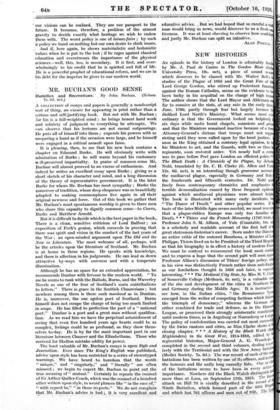MR. BUCHAN'S GOOD SENSE
Homilies and Recreations. By John Buchan. (Nelson. 7s. 6d. net.)
A COLLECTION of essays and papers is generally a nondescript sort of thing, an excuse for appearing in print rather than a serious and self-justifying book. But not with Mr. Buchan ; for his is a full-weighted mind ; he brings honest hard work and sobriety of judgment to everything he attempts. We can observe that his lectures are not casual outpourings. He puts all of himself into them ; expends his powers with as unsparing a hand as if the occasion were large, and he himself were engaged in a critical assault upon fame.
It is pleasing, then, to see that his new book contains a chapter on Edmund Burke. He will obviously write with admiration of Burke ; he will warm beyond his customary wall-preserved impartiality. In praise of common sense Mr. Buchan will almost proceed to an excess of enthusiasm. And indeed he writes an excellent essay upon Burke ; giving us a short sketch of his character and mind, and a long discussion of the theory of representative government. It is the later Burke for whom Mr. Buchan has most sympathy ; Burke the conserver of tradition, whose deep eloquence was so beautifully adapted to making commonplaces live again in all their original newness and force. Out of this book we gather that Mr. Buchan's most spontaneous worship is given to three men who share this capacity to dignify common sense—to Cicero, Burke and Matthew Arnold.
But it is difficult to,decide which is the best paper in the book.; There is a clean, sensitive criticism of Lord Balfour ; an exposition of Foch's genius, which succeeds in proving that there was spirit and vision in the conduct of the last years of the War ; an open-minded argument upon The Old and the New in Literature. The most welcome of all, perhaps, will be the articles upon the literature of Scotland. Mr. Buchan is at home in these regions. He speaks with knowledge, and there is affection in his judgments. He can lead us down attractive by-ways with sureness and with a temperate illumination.
Although he has no space for an extended appreciation, he. recommends Dunbar with fervour to the modern world. " To me he seems to rank with the Ballads, Burns, and the Waverley Novels as one of the four of Scotland's main contributions to letters." There is grace in the Scottish Chaucerians ; but nowhere among them is there such manhood as in_ Dunbar. He is, moreover, the one ageless poet of Scotland. Burns himself does not escape the charge of being too much limited in scope. He has filled to perfection the part of a " national poet." Dunbar is a poet and a great man without qualifica- tion. As we read him we have the perpetual astonishment of seeing that even five hundred years ago hearts could be as complex, feelings could be as profound, as they show them- selves to-day. He is by far the most important poet, in our literature between Chaucer and the Elizabethans. Those who contend for Skelton mistake oddity for power.
The least valuable of Mr. Buchan's essays is upon Style and Journalism. Ever since The King's English was published, advice upon style has been restricted to a series of stereotyped warnings. We have heard to, boredom that the words " unique," and " singularly," and "literally " are often misused, ; we begin .to expect Mr. Buchan to point out the true meaning of " mutual." Certainly he repeats the counsel of Sir Arthur Quiller-Couch, which was the counsel of a hundred other writers upon style, to avoid phrases like " in the case of," " with regard. to," " in these-respects." We do not complain. that Mr. Buchan's advice is bad ;._ it is very excellent .and.. educative advice. But we had hoped that so careful a era!, man would bring us news, would discover to us a fresh tiveness. It was at least cheering to observe how confifieDi and justly Mr. Buchan can split an infinitive.
ALAN Pon ri






















































 Previous page
Previous page